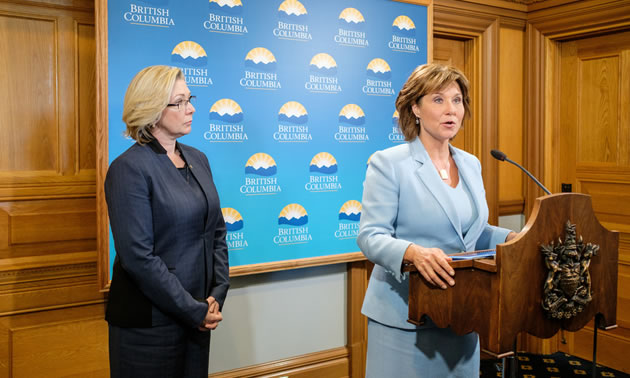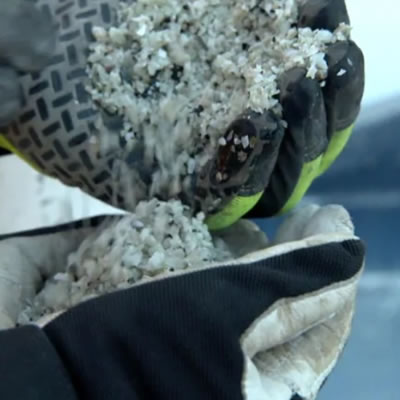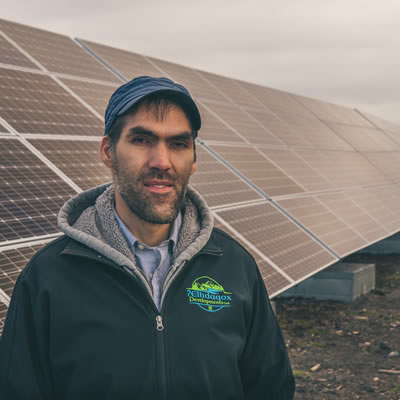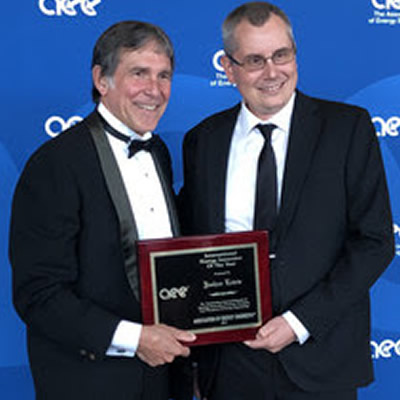B.C. issues environmental assessment certificate for Trans Mountain Pipeline Project

B.C. Premier Christy Clark announces the issuing of an Environmental Assessment Certificate for the Trans Mountain Pipeline Project. — Photo: BC Government
Environment Minister Mary Polak and Natural Gas Development Minister Rich Coleman issued the following statement following their issuing of an Environmental Assessment (EA) Certificate for the B.C. portion of the Trans Mountain Pipeline Project:
“Today we issued an EA Certificate for the project, understanding that all inter-provincial pipelines are under federal jurisdiction. We have looked at areas where we can improve the project by adding conditions that will build upon those already established by the federal government.
“The Environmental Assessment Office recommended 37 new conditions be attached, to address concerns raised by communities and Aboriginal groups during its consultation. We have agreed to all 37 conditions, ensuring the project meets the high standards we demand in British Columbia.
“The conditions we have attached will make sure ongoing consultation with First Nations occurs and also provides further protection of wetlands, wildlife habitat and caribou and grizzly populations. They are all legally enforceable, and will help to minimize or avoid altogether potential issues within areas of provincial interest.
“Clearly, the project will have economic benefits for British Columbia workers, families and communities. However, we have always been clear economic development will not come at the expense of the environment. We believe environmental protection and economic development can occur together, and the conditions attached to the EA certificate reflect that.”
BC's Premier Christy Clark also pointed out that the agreement between the Province of British Columbia and a private company, will see B.C. receiving significant fiscal benefits direct from Kinder Morgan worth up to $1 billion. The company will pay the Province between $25 million and $50 million annually for 20 years. The actual amount paid to the Province each year will depend whether the expanded pipeline is operating at full capacity on its spot market contracts.
Revenues from the Trans Mountain expansion will be dedicated to the new BC Clean Communities program, a source of funding for projects that protect the environment and benefit communities. The BC Clean Communities program will launch once revenues to the Province from Kinder Morgan commence.
When the BC Clean Communities program is fully in place, it will be based on the following principles:
- A grant application process will be established, similar to the current gaming grant application process.
- Revenues will be dispersed as grants for grassroots, community-led environmental protection or enhancement initiatives.
- Grants can be combined with other funding sources that require matching funds, however, BC Clean Communities grants will not require matching funds by applicants.
- B.C.’s polluter pay principle will remain paramount. Funds from BC Clean Communities will not be allowed to replace a polluter’s requirement to pay for clean-up and compensation.
Examples of potential projects eligible for funding under the BC Clean Communities program include, but are not limited to:
- Purchasing land for parks.
- Restoring historic sites
- Cleaning up orphaned sites or spills where the polluter is unknown.
- Restoring habitat
- Controlling invasive species
- Cleaning up beaches, rivers or public waterfront property
- Establishing and promoting recycling programs in small, rural communities.
- Marine conservation and monitoring




